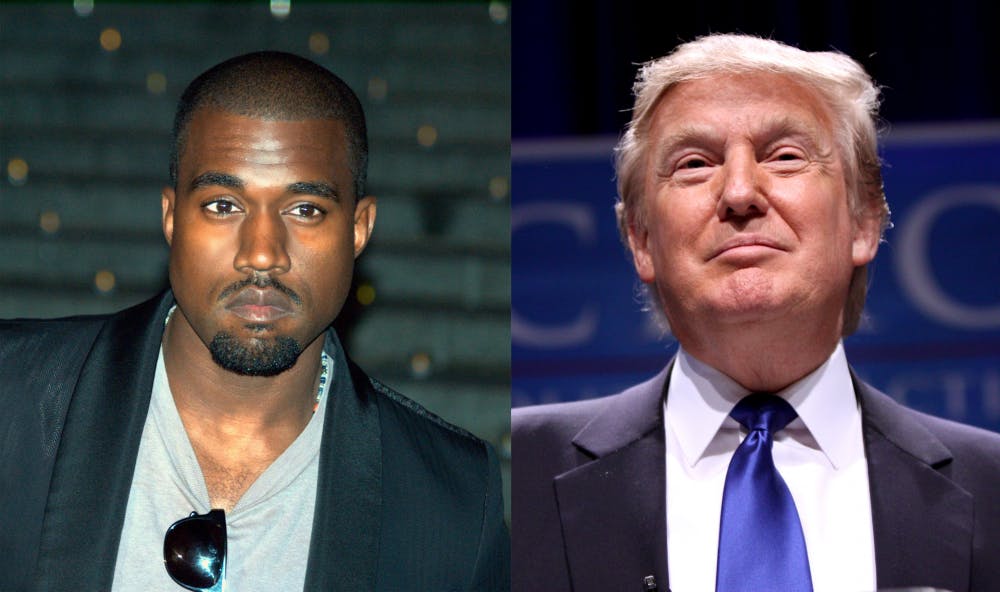Kanye West made headlines last week for supporting President Donald Trump and his campaign slogan, “Make America Great Again.” After a nearly year-long hiatus, the rapper returned to Twitter and rained down a series of tweets about a range of topics from creativity as currency, spreading love and following your own vision. His more politically-charged tweets gained him the most attention. Commentators debated about his mental health and others wrote it off as a publicity stunt for his forthcoming album. Fellow Chicago rapper, Chance the Rapper, also came under fire for defending Kanye on Twitter. The most striking aspect of this controversial episode was the endorsement by the president and others for Kanye. This reaction has been very different than what occurred in response to other celebrities who turned political. Trump’s reaction to both shows the double standard when it comes to celebrities’ speech. In all, celebrities are public figures, but they are also citizens of this country and should be encouraged to stand in their beliefs — regardless of where they fall on the political spectrum.
Kanye’s initial tweet referred to the president as his “brother,” insisting that they were “dragon energy.” He later tweeted a picture of a signed “MAGA” hat which was retweeted by the president. President Trump also thanked Kanye, calling his initial tweet “very cool.” Kanye continued the next day by tweeting about MAGA. He clarified his tweets later, insisting that, ”I don't agree with everything Trump does. I don't agree 100% with anyone but myself.”
Chance The Rapper, also from Chicago, began by innocently retweeting a few of Kanye’s tweets. His tweeting became controversial when he wrote, “Black people don’t have to be democrats.” Though this tweet is not explicitly connected to the president or Kanye, Twitter users drew connections between the two. Two days later, he issued an apology on his Twitter, stating that his intention was to help a friend, not because he agreed with Trump. He believed that his statement about the black people and the Democratic Party was a “deflection” — a true statement said at the wrong time.
Trump not only retweeted a couple of Kanye’s tweets, but the president also tweeted, “Kanye West has performed a great service to the Black Community - Big things are happening and eyes are being opened for the first time in Decades - Legacy Stuff! Thank you also to Chance and Dr. Darrell Scott, they really get it (lowest Black & Hispanic unemployment in history).” The president’s son, Donald Trump Jr. retweeted several tweets by Kanye, Chance The Rapper and even a tweet by reality star Kim Kardashian, Kanye’s wife. In response to Chance’s tweet about Democrats, Trump Jr. wrote, “It’s always incredible to watch a cultural shift happen in real time. I respect those willing to take the lead breaking with convention. That takes guts … though there’s a better word for it. (two basketball emojis)”
It is incredibly ironic that the president’s son would include the basketball emojis considering how athletes have been treated by his father when they make political statements. After NBA player Stephen Curry publicly stated that he did not want to visit the White House to celebrate the Golden State Warriors’ championship title because he did not agree with Trump’s views, President Trump went on Twitter to revoke the invitation. That same day, while speaking at a campaign rally in Alabama, President Trump commented on the NFL, calling team owners to fire or suspend players who protested during the national anthem. He then went on Twitter and talked about fans protesting games and changing NFL policy. This protest was initiated by former player, Colin Kaepernick, in 2016 and his protest involvement ultimately resulted in him effectively being blacklisted by the league.
Earlier this year, a TV host stated that basketball player LeBron James was too uneducated to speak on politics and told him to “shut up and dribble”. The discourse on who can and can not speak on politics has been applied primarily to professional athletes, and President Trump has been an influential figure at the front line for this argument. The same sentiments are not currently being applied to Kanye West. He, like James and Trump before he became president, has never held public office and yet, he is getting endorsed by the same person who believed Colin Kaepernick and other players should be fired for expressing their beliefs about police brutality and #BlackLivesMatter.
By discussing political parties and specific political figures, both Kanye and Chance have expressed more explicitly political statements than the athletes who talked more broadly. The president has not denounced this action because it puts his political party at an advantage. The actions of Kanye West and Colin Kaepernick both represent celebrities using their platform to take a stand, yet only one was praised by the president and his affiliates. The response by President Trump signals that he believes that celebrities’ speech can impact their fans and community. Considering that both Chance The Rapper and Kanye West distanced themselves from his politics, the president should rethink how powerful they will be as his advocates. Regardless, this incident reminds America that celebrities are tax-paying citizens who have the right to express their political beliefs — regardless of if it is popular or not.
Zari Taylor is a Senior Opinion columnist for The Cavalier Daily. She can be reached at opinion@cavalierdaily.com.







